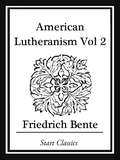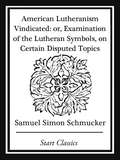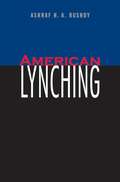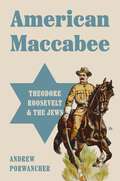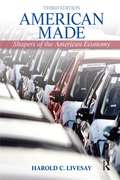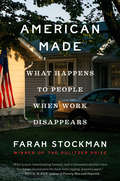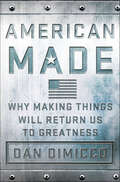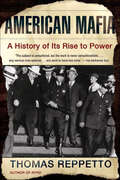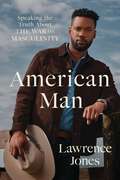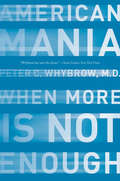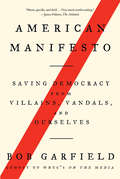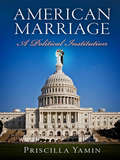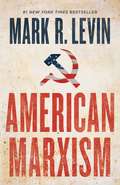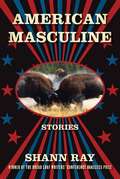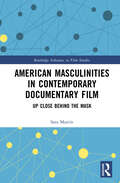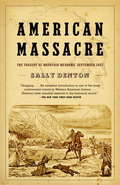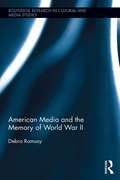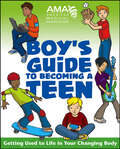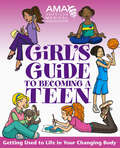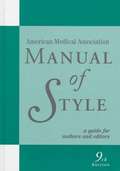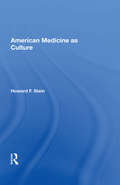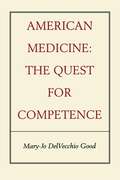- Table View
- List View
American Lutheranism
by Friedrich Bente"American Lutheranism Vol 2" is a religious text written by Friedrich Bente.
American Lutheranism Vindicated: or, Examination of the Lutheran Symbols, on Certain Disputed Topics
by Samuel Simon Schmucker"American Lutheranism Vindicated: or, Examination of the Lutheran Symbols, on Certain Disputed Topics" is a religious text written by Samuel Simon Schmucker.
American Lynching
by Ashraf H. RushdyA history of lynching in America over the course of three centuries, from colonial Virginia to twentieth-century Texas.After observing the varying reactions to the 1998 death of James Byrd Jr. in Texas, called a lynching by some, denied by others, Ashraf Rushdy determined that to comprehend this event he needed to understand the long history of lynching in the United States. In this meticulously researched and accessibly written interpretive history, Rushdy shows how lynching in America has endured, evolved, and changed in meaning over the course of three centuries, from its origins in early Virginia to the present day.&“A work of uncommon breadth, written with equally uncommon concision. Excellent.&” —N. D. B. Connolly, Johns Hopkins University&“Provocative but careful, opinionated but persuasive . . . Beyond synthesizing current scholarship, he offers a cogent discussion of the evolving definition of lynching, the place of lynchers in civil society, and the slow-in-coming end of lynching. This book should be the point of entry for anyone interested in the tragic and sordid history of American lynching.&” —W. Fitzhugh Brundage, author of Lynching in the New South: Georgia and Virginia, 1880-1930&“A sophisticated and thought-provoking examination of the historical relationship between the American culture of lynching and the nation&’s political traditions. This engaging and wide-ranging meditation on the connection between democracy, lynching, freedom, and slavery will be of interest to those in and outside of the academy.&” —William Carrigan, Rowan University&“In this sobering account, Rushdy makes clear that the cultural values that authorize racial violence are woven into the very essence of what it means to be American. This book helps us make sense of our past as well as our present.&” —Jonathan Holloway, Yale University
American Maccabee: Theodore Roosevelt and the Jews
by Andrew PorwancherA major biography of a mesmerizing statesman whose complex bond with the Jewish people forever shaped their lives—and his legacyA scion of the Protestant elite, Theodore Roosevelt was an unlikely ally of the waves of impoverished Jewish newcomers who crowded the docks at Ellis Island. Yet from his earliest years he forged ties with Jews never before witnessed in a president. American Maccabee traces Roosevelt&’s deep connection with the Jewish people at every step of his dazzling ascent. But it also reveals a man of contradictions whose checkered approach to Jewish issues was no less conflicted than the nation he led.As a rising political figure in New York, Roosevelt barnstormed the Lower East Side, giving speeches to packed halls of Jewish immigrants. He rallied for reform of the sweatshops where Jewish laborers toiled for pitiful wages in perilous conditions. And Roosevelt repeatedly venerated the heroism of the Maccabee warriors, upholding those storied rebels as a model for the American Jewish community. Yet little could have prepared him for the blood-soaked persecution of Eastern European Jews that brought a deluge of refugees to American shores during his presidency. Andrew Porwancher uncovers the vexing challenges for Roosevelt as he confronted Jewish suffering abroad and antisemitic xenophobia at home.Drawing on new archival research to paint a richly nuanced portrait of an iconic figure, American Maccabee chronicles the complicated relationship between the leader of a youthful nation and the people of an ancient faith.
American Machiavelli
by John Lamberton HarperAlexander Hamilton (1757-1804) was an illegitimate West Indian emigrant who became the first U. S. Secretary of the Treasury. American Machiavelli focuses on Hamilton's controversial activities as foreign policy adviser and aspiring military leader. In the first major study of his foreign policy role in 30 years, John Lamberton Harper describes a decade of bitter division over the role of the Federal government in the economy during the 1790s and draws parallels between Hamilton and the sixteenth century Italian political adviser, Niccolò Machiavelli. Harper provides an original and highly readable account of Hamiltonas famous clashes with Thomas Jefferson and John Adams, and his key role in defining the U. S. national security strategy. John Lamberton Harper is Professor of Foreign Policy and European Studies at the Johns Hopkins University Bologna Center. He is the author of America and the Reconstruction of Italy, 1945-1948 (Cambridge 1986), winner of the 1987 Marraro Prize from the Society for Italian Historical Studies, and American Visions of Europe: Franklin D. Roosevelt, George F. Kennan, and Dean G. Asheson (Cambridge 1994), winner of the 1995 Robert Ferrell Prize from the Society of Historians of American Foreign Relations. His articles and reviews have appeared in numerous publications, including The American Historical Review, The Journal of American History, The Times Literary Supplement and Foreign Affairs.
American Made: Shaping the American Economy
by Harold C LivesayAmerican Made is a best-selling collection of biographical sketches that introduces key trends of American business.The book details American business through time by presenting the history of people who forever changed the way that Americans do business. Harold Livesay maintains clarity and intellectual acumen while highlighting two themes: globalization and the impact of information technology on business. This edition includes updated stories of its hallmark historical business figures with the latest scholarship as well as additional biographies of figures that have redefined American business in recent years.
American Made: What Happens to People When Work Disappears
by Farah StockmanWhat happens when Americans lose their jobs? In this illuminating story of ruin and reinvention, Pulitzer Prize-winning journalist Farah Stockman gives an up-close look at the profound role work plays in our sense of identity and belonging, as she follows three workers whose lives unravel when the factory they have dedicated so much to closes down. &“With humor, breathtaking honesty, and a historian&’s satellite view, Stockman illuminates the fault lines ripping America apart.&”—Beth Macy, author of Factory Man and DopesickShannon, Wally, and John built their lives around their place of work. Shannon, a white single mother, became the first woman to run the dangerous furnaces at the Rexnord manufacturing plant in Indianapolis, Indiana, and was proud of producing one of the world&’s top brands of steel bearings. Wally, a black man known for his initiative and kindness, was promoted to chairman of efficiency, one of the most coveted posts on the factory floor, and dreamed of starting his own barbecue business one day. John, a white machine operator, came from a multigenerational union family and clashed with a work environment that was increasingly hostile to organized labor.The Rexnord factory had served as one of the economic engines for the surrounding community. When it closed, hundreds of people lost their jobs. What had life been like for Shannon, Wally, and John, before the plant shut down? And what became of them after the jobs moved to Mexico and Texas? American Made is the story of a community struggling to reinvent itself. It is also a story about race, class, and American values, and how jobs serve as a bedrock of people&’s lives and drive powerful social justice movements. This revealing book shines a light on a crucial political moment, when joblessness and anxiety about the future of work have made themselves heard at a national level. Most of all, it is a story about people: who we consider to be one of us and how the dignity of work lies at the heart of who we are.
American Made: Why Making Things Will Return Us to Greatness
by Dan DiMiccoAmerican manufacturing is on life support—at least, that's what most people think. The exodus of jobs to China and other foreign markets is irreversible, and anything that is built here requires specialized skills the average worker couldn't hope to gain. Not so, says Dan DiMicco, chairman and former CEO of Nucor, America's largest steel company. He not only revived a major US manufacturing firm during a recession, but helped galvanize the flagging domestic steel industry when many of his competitors were in bankruptcy or headed overseas. In American Made, he takes to task the politicians, academics, and political pundits who, he contends, are exacerbating fears and avoiding simple solutions for the sake of nothing more than their own careers, and contrasts them with the postwar leaders who rebuilt Europe and Japan, put a man on the moon, and kept communism at bay. We need leaders of such resolve today, he argues, who can tackle a broken job-creation engine by restoring manufacturing to its central role in the U.S. economy—and cease creating fictitious "service businesses" where jobs evaporate after a year or two, as in a Ponzi scheme. With his trademark bluntness, DiMicco tackles the false promise of green jobs and the hidden costs of outsourcing. Along the way, he shares the lessons he's learned about good leadership, crisis management, and the true meaning of innovation, and maps the road back to robust economic growth, middle-class prosperity, and American competitiveness.
American Mafia: A History of Its Rise to Power
by Thomas Reppetto"Reppetto's book earns its place among the best . . . he brings fresh context to a familiar story worth retelling." —The New York Times Book Review Organized crime—the Italian American kind—has long been a source of popular entertainment and legend. Now Thomas Reppetto provides a balanced history of the Mafia's rise—from the 1880s to the post-WWII era—that is as exciting and readable as it is authoritative.Structuring his narrative around a series of case histories featuring such infamous characters as Lucky Luciano and Al Capone, Reppetto draws on a lifetime of field experience and access to unseen documents to show us a locally grown Mafia. It wasn't until the 1920s, thanks to Prohibition, that the Mafia assumed what we now consider its defining characteristics, especially its octopuslike tendency to infiltrate industry and government. At mid-century the Kefauver Commission declared the Mafia synonymous with Union Siciliana; in the 1960s the FBI finally admitted the Mafia's existence under the name La Cosa Nostra.American Mafia is a fascinating look at America's most compelling criminal subculture from an author who is intimately acquainted with both sides of the street.
American Magic: A Thriller
by Zach FehstIn this fast-paced, international thriller, chaos erupts after a shadowy figure with ties to an elite and ancient society posts incantations on the dark web that allow people to perform real magic.When an enigmatic message uploaded to the dark web turns out to contain an ancient secret giving regular people the power to do impossible things, like levitate cars or make themselves invisible, American government officials panic. They know the demo videos on YouTube and instructions for incantations could turn from fantastical amusement to dangerous weapon at the drop of the hat, and they scramble to keep the information out of the wrong hands. They tap Ben Zolstra, an ex-CIA field operative whose history with the Agency is conflicted at best, to lead the team that’s racing to contain the dangerous knowledge—and track down the mysterious figure behind the leak who threatens that even more dangerous spells will be released one by one until the world as we know it no longer exists. This sweeping, globe-spanning thriller explores the dark consequences of a question mankind has been asking for centuries: What if magic were real?
American Magnitude: Hemispheric Vision and Public Feeling in the United States
by Christa J. OlsonAt a moment in US politics when racially motivated nationalism, shifting relations with Latin America, and anxiety over national futures intertwine, understanding the long history of American preoccupation with magnitude and how it underpins national identity is vitally important. In American Magnitude, Christa J. Olson tracks the visual history of US appeals to grandeur, import, and consequence (megethos), focusing on images that use the wider Americas to establish US character. Her sources—including lithographs from the US-Mexican War, pre–Civil War paintings of the Andes, photo essays of Machu Picchu, and WWII-era films promoting hemispheric unity—span from 1845 to 1950 but resonate into the present. <p><p>Olson demonstrates how those crafting the appeals that feed the US national imaginary—artists, scientists, journalists, diplomats, and others—have invited US audiences to view Latin America as a foil for the greatness of their own nation and encouraged white US publics in particular to see themselves as especially American among Americans. She reveals how each instance of visual rhetoric relies upon the eyes of others to instantiate its magnitude—and falters as some viewers look askance instead. The result is the possibility of a post-magnitude United States: neither great nor failed, but modest, partial, and imperfect.
American Man: Speaking the Truth about the War on Masculinity
by Lawrence JonesFox & Friends cohost Lawrence Jones delivers the common sense book America needs more than ever in this definitive takedown of the left&’s never-ending attacks on masculinity. A generation ago it was understood that men and women were unique, yet interdependent, and designed by God to be that way. Today, the woke crowd wants you to believe masculinity is &“toxic.&” In his first book, Lawrence embarks on a thorough examination of who is doing the attacking and why. Informed by his travels across the country for Fox News, Lawrence explains how confused progressives are about manhood—and how powerful the need is to set the record straight. Men, he argues, are indispensable to thriving families and prosperous societies, and the sooner men start acting like men, the better off we all will be. Packed with stories from his own life and work, Lawrence makes a persuasive case for the virtues of manliness—courage, resilience, godliness, and self-reliance among others. Lawrence challenges his fellow men to live up to their responsibilities as men and to fill the cultural void woke ideologues have been happy to exploit. In confronting the chaos of contemporary culture, Lawrence is forced to reexamine his own beliefs as he spurs an honest discussion about what it means to be a man in America. The book also includes candid, never-before-shared interviews conducted by Lawrence of his Fox News colleagues, like Sean Hannity, Mark Levin, Pete Hegseth, Will Cain, as well as other prominent voices like NFL great Ben Watson and actor Dean Cain. This insightful and uncompromising book from one of the country&’s fastest rising stars will enlighten and inspire readers—as it proves once and for all the crucial role men can and must play in American life today.
American Mania: When More is Not Enough
by Peter C. WhybrowA doctor's bold analysis of the cultural disease that afflicts us all. Despite an astonishing appetite for life, more and more Americans are feeling overworked and dissatisfied. In the world's most affluent nation, epidemic rates of stress, anxiety, depression, obesity, and time urgency are now grudgingly accepted as part of everyday existence they signal the American Dream gone awry. Peter C. Whybrow, director of the Neuropsychiatric Institute at UCLA, grounds the extraordinary achievements and excessive consumption of the American nation in an understanding of the biology of the brain's reward system offering for the first time a comprehensive and physical explanation for the addictive mania of consumerism. American Mania presents a clear and novel vantage point from which to understand the most pressing social issues of our time, while offering an informed approach to refocusing our pursuit of happiness. Drawing upon rich scientific case studies and colorful portraits, "this fascinating and important book will change the way you think about American life" (Karen Olson, Utne Reader).
American Manifesto: Saving Democracy from Villains, Vandals, and Ourselves
by Bob GarfieldDo you fear for our democracy? Are you perplexed by Trumpism? Are you ready to throw in the towel? Don’t! This is your guidebook to reassembling our hyperpolarized American society in six (not–so–easy) steps, written by cohost of WNYC's On the Media Bob GarfieldAs is often observed, Trump is a symptom of a virus that has been incubating for at least fifty years. But not often observed is where the virus is imbedded: in the psychic core of our identity. In American Manifesto: Saving Democracy from Villains, Vandals, and Ourselves, popular media personality Bob Garfield examines the tragic confluence of the American preoccupation with identity and the catastrophic disintegration of the mass media. Garfield investigates how we’ve gotten to this moment when our identity is threatened by both the left and the right, when e pluribus unum is no longer a source of national pride, and why, when looking through this lens of identity, the rise of Trumpism is no surprise. Overlaying this crisis is the rise of the Facebook–Google duopoly and the filter bubble of social media, where identity is insular and immutable.But fear not! WNYC’s On the Media cohost Garfield has ideas about how we may counter the forces of fragmentation—the manifesto itself: six steps to take to reassemble our fractured society. A quick, fascinating read, American Manifesto offers not only a vision of a country in extremis, but also a plan for how to address the ways in which our democracy is imperiled. Provocative, profound, and sometimes hilariously profane, American Manifesto is a call to action like no other.
American Marriage
by Priscilla YaminAs states across the country battle internally over same-sex marriage in the courts, in legislatures, and at the ballot box, activists and scholars grapple with its implications for the status of gays and lesbians and for the institution of marriage itself. Yet, the struggle over same-sex marriage is only the most recent political and public debate over marriage in the United States. What is at stake for those who want to restrict marriage and for those who seek to extend it? Why has the issue become such a national debate? These questions can be answered only by viewing marriage as a political institution as well as a religious and cultural one.In its political dimension, marriage circumscribes both the meaning and the concrete terms of citizenship. Marriage represents communal duty, moral education, and social and civic status. Yet, at the same time, it represents individual choice, contract, liberty, and independence from the state. According to Priscilla Yamin, these opposing but interrelated sets of characteristics generate a tension between a politics of obligations on the one hand and a politics of rights on the other. To analyze this interplay, American Marriage examines the status of ex-slaves at the close of the Civil War, immigrants at the turn of the twentieth century, civil rights and women's rights in the 1960s, and welfare recipients and gays and lesbians in the contemporary period. Yamin argues that at moments when extant political and social hierarchies become unstable, political actors turn to marriage either to stave off or to promote political and social changes. Some marriages are pushed as obligatory and necessary for the good of society, while others are contested or presented as dangerous and harmful. Thus political struggles over race, gender, economic inequality, and sexuality have been articulated at key moments through the language of marital obligations and rights. Seen this way, marriage is not outside the political realm but interlocked with it in mutual evolution.
American Marxism
by Mark R. LevinThe six-time #1 New York Times bestselling author, Fox News star, and radio host Mark R. Levin explains how the dangers he warned against in the “timely yet timeless” (David Limbaugh, author of Jesus Is Risen) bestseller Liberty and Tyranny have come to pass. <P><P>In 2009, Mark R. Levin galvanized conservatives with his unforgettable manifesto Liberty and Tyranny, by providing a philosophical, historical, and practical framework for halting the liberal assault on Constitution-based values. That book was about standing at the precipice of progressivism’s threat to our freedom and now, over a decade later, we’re fully over that precipice and paying the price. <P><P>In American Marxism, Levin explains how the core elements of Marxist ideology are now pervasive in American society and culture—from our schools, the press, and corporations, to Hollywood, the Democratic Party, and the Biden presidency—and how it is often cloaked in deceptive labels like “progressivism,” “democratic socialism,” “social activism,” and more. With his characteristic trenchant analysis, Levin digs into the psychology and tactics of these movements, the widespread brainwashing of students, the anti-American purposes of Critical Race Theory and the Green New Deal, and the escalation of repression and censorship to silence opposing voices and enforce conformity. Levin exposes many of the institutions, intellectuals, scholars, and activists who are leading this revolution, and provides us with some answers and ideas on how to confront them. <P><P> As Levin writes: “The counter-revolution to the American Revolution is in full force. And it can no longer be dismissed or ignored for it is devouring our society and culture, swirling around our everyday lives, and ubiquitous in our politics, schools, media, and entertainment.” And, like before, Levin seeks to rally the American people to defend their liberty. <P><P><b>A New York Times Best Seller</b>
American Masculine: Stories
by Shann RayWinner of the 2010 Bakeless Prize for Fiction, a muscular debut that reconfigures the American WestThe American West has long been a place where myth and legend have flourished. Where men stood tall and lived rough. But that West is no more. In its place Shann Ray finds washedup basketball players, businessmen hiding addictions, and women fighting the inexplicable violence that wells up in these men. A son struggles to accept his father's apologies after surviving a childhood of beatings. Two men seek empty basketball hoops on a snowy night, hoping to relive past glory. A bull rider skips town and rides herd on an unruly mob of passengers as he searches for a thief on a train threading through Montana's Rocky Mountains. In these stories, Ray grapples with the terrible hurt we inflict on those we love, and finds that reconciliation, if far off, is at least possible. The debut of a writer who is out to redefine the contours of the American West, American Masculine is a deeply felt and fiercely written ode to the country we left behind.
American Masculinities in Contemporary Documentary Film: Up Close Behind the Mask (Routledge Advances in Film Studies)
by Sara MartínMost documentaries deal with men, but what do they actually say about masculinity? In this groundbreaking volume Sara Martín analyses more than forty 21st-century documentaries to explore how they represent American men and masculinity. From Jennifer Siebel Newsom’s The Mask You Live In to Raoul Peck’s I Am Not Your Negro, this volume explores sixteen different faces of American masculinity: the good man, the activist, the politician, the whistleblower, the criminal, the sexual abuser, the wrongly accused, the dependent man, the soldier, the capitalist, the adventurer, the sportsman, the architect, the photographer, the musician, and the writer. The collective portrait drawn by the documentaries discloses a firm critical stance against the contradictions inherent in patriarchy, which makes American men promises of empowerment it cannot fulfill. The filmmakers’ view of American masculinity emphasizes the vulnerability of disempowered men before the abuses of the patriarchal system run by hegemonic men and a loss of bearings about how to be a man after the impact of feminism, accompanied nonetheless by a celebration of resilient masculinity and of the good American man. Firmly positioning documentaries as an immensely flexible, relevant tool to understand 21st-century American men and masculinity, their past, present, and future, this book will interest students and scholars of film studies, documentary film, American cultural studies, gender, and masculinity.
American Massacre: The Tragedy At Mountain Meadows, September 1857
by Sally DentonControversy has raged over identity of the organizers and participants of the "Mountain Meadows Massacre" ever since a California-bound wagon train was beset in Utah Territory in 1857 by local Mormons and Paiute Indians (as the story is conventionally told--Paiutes contest this version and are now supported by physical evidence), killing all but seven of the 140 emigrants over the course of four days. The only person ever held criminally responsible for the crime, John D. Lee, was executed 20 years later, condemning the Mormon Church Leaders as the real instigators of the crime. Investigative reporter Denton revisits those events, exploring the development and aftermath of the episode, concluding that Brigham Young and other church leaders were indeed responsible. Annotation (c)2003 Book News, Inc., Portland, OR (booknews.com)
American Media and the Memory of World War II (Routledge Research in Cultural and Media Studies)
by Debra RamsayFor three generations of Americans, World War II has been a touchstone for the understanding of conflict and of America’s role in global affairs. But if World War II helped shape the perception of war for Americans, American media in turn shape the understanding and memory of World War II. Concentrating on key popular films, television series, and digital games from the last two decades, this book explores the critical influence World War II continues to exert on a generation of Americans born over thirty years after the conflict ended. It explains how the war was configured in the media of the wartime generation and how it came to be repurposed by their progeny, the Baby Boomers. In doing so, it identifies the framework underpinning the mediation of World War II memory in the current generation’s media and develops a model that provides insight into the strategies of representation that shape the American perspective of war in general.
American Medical Association Boy's Guide to Becoming a Teen: Getting Used to Life in Your Changing Body
by American Medical AssociationA boy&’s &“straightforward, accessible, and nonjudgmental&” guide to everything they need to know about puberty and becoming a teen (Booklist). Becoming a teen is an important milestone in every boy&’s life. It&’s especially important at this time to get answers and advice from a trusted source. The American Medical Association Boy&’s Guide to Becoming a Teen is filled with invaluable advice to get you ready for the changes you will experience during puberty. Learn about these important topics and more: · Puberty and what kinds of physical and emotional changes you can expect—from your developing body to your feelings about girls · The importance of eating the right foods and taking care of your body · Pimples, acne, and how to properly care for your skin · Your reproductive system—inside and out · Thinking about relationships and dealing with new feelings The American Medical Association Boy&’s Guide to Becoming a Teen will help you understand the health issues that are of most concern to teenage boys, and will teach you how to be safe, happy, and healthy through these years.
American Medical Association Girl's Guide to Becoming a Teen: Getting Used to Life in Your Changing Body
by American Medical AssociationA girl&’s straightforward, accessible, and nonjudgmental guide to everything they need to know about adolescence and growing up. Becoming a teen is an important milestone in every girl&’s life. It&’s especially important at this time to get answers and advice from a trusted source. The American Medical Association Girl&’s Guide to Becoming a Teen is filled with invaluable advice to get you ready for the changes you will experience during puberty. Learn about these important topics and more: · Puberty and what kinds of physical and emotional changes you can expect—from your developing body to your feelings about boys · The importance of eating the right foods and taking care of your body · Your reproductive system inside and out · Starting your period—what it means and how to handle it · Thinking about relationships and dealing with new feelings The American Medical Association Girl&’s Guide to Becoming a Teen will help you understand the health issues that are of most concern to teenage girls, and will teach you how to be safe, happy, and healthy through these years. &“Girls covers the physical and emotional changes that puberty brings, along with solid tips about grooming, diet, exercise, and other health issues, such as eating disorders. . . . Girls will find plenty of useful information.&” —Booklist
American Medical Association Manual of Style: A Guide for Authors and Editors (9th edition)
by Cheryl IversonThe latest edition features an expanded chapter on legal and ethical concerns in publishing. Readers will also find an extensive chapter on statistics, a completely updated chapter on nomenclature, new policies for eponyms and numbers styles, a larger references section, an expanded discussion of inclusive language and abbreviations, and a larger section on figures and tables. A new section on typography is also featured, along with current information on electronic publishing, encompassing rapid changes affecting the publishing environment. End-of-chapter references make the book easier to use, and the entire text is reviewed by more than 70 editors for accuracy and dependability.
American Medicine As Culture
by Howard F. SteinThis book situates biomedicine within American culture and argues that the very organization and practice of medicine are themselves cultural. It demonstrates the symbolic construction of clinical reality within American biomedicine and shows how biomedicine never leaves the realm of the personal.
American Medicine: The Quest for Competence
by Mary-Jo DelVecchio GoodWhat does it mean to be a good doctor in America today? How do such challenges as new biotechnologies, the threat of malpractice suits, and proposed health-care reform affect physicians' ability to provide quality care?These and many other crucial questions are examined in this book, the first to fully explore the meaning and politics of competence in modern American medicine. Based on Mary-Jo DelVecchio Good's recent ethnographic studies of three distinct medical communities—physicians in rural California, academics and students involved in Harvard Medical School's innovative "New Pathway" curriculum, and oncologists working on breast cancer treatment—the book demonstrates the centrality of the issue of competence throughout the medical world. Competence, it shows, provides the framework for discussing the power struggles between rural general practitioners and specialists, organizational changes in medical education, and the clinical narratives of high-technology oncologists. In their own words, practitioners, students, and academics describe what competence means to them and reveal their frustration with medical-legal institutions, malpractice, and the limitations of peer review and medical training.Timely and provocative, this study is essential reading for medical professionals, academics, anthropologists, and sociologists, as well as health-care policymakers.
